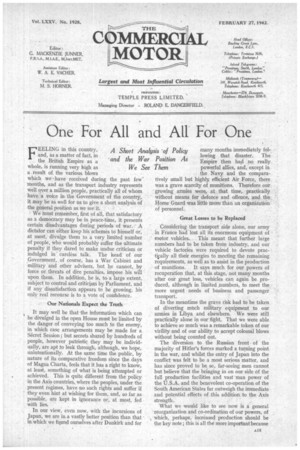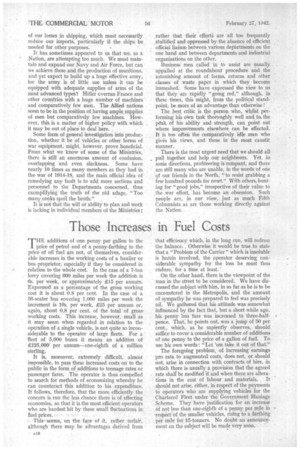One For All and All For One
Page 17

Page 18

If you've noticed an error in this article please click here to report it so we can fix it.
FEELING in this country, and, as a matter of fact, in the British Empire as a whole, is running very high as a result of the various, blows which •we have received during the past few• months, and as the transport industry represents well over a million people, practically all of whom have a voice in the Government of the country, it may be as well for us to give a short analysis of the general position as we see it.
We must remember, first of all, that satisfactory as a democracy may be in peace-time, it presents certain disadvantages during periods of war. ' A dictator can either keep his schemes to himself or, at most, divulge them to a very limited number of people, who would probably suffer the ultimate penalty if they dared to make undue criticism or indulged in' careless talk. The head' of. our Government, of course, has a War Cabinet and military and other advisers, but he cannot, by force or threats of dire penalties, impose his will upon them. In addition, he is, toa large extent, subject to control and criticism by Parliament, and if any dissatisfaction appears to be growing, his only real recourse is to a vote of confidence.
Our Nationals Expect the Truth It may well be that the information which can be divulged in the open House must be limited by the danger of conveying too much to the enemy, in which case arrangements may be made for a Secret Session ; but secrets shared by hundreds of people, however patriotic they may be individually, are apt to leak through, although, we hope, unintentionally. At the same time the public, by nature of its comparative freedom since the days of Magna Charta, feels that it has a right to know, at least, something of what is being attempted or achieved. This is quite different from the policy in the Axis countries, where the peoples, under the present regimes, have no such rights and suffer if they even hint at wishing for them, and, sofar as possible, are kept in ignorance or, at most, fed with lies.
. In our view, even now, with the incursions of Japan, we are in a vastly better position than that in which we fctund ourselves after Dunkirk and for many months immediately following that disaster. The Empire then had no really powerful allies, and, except in the Navy and the comparatively small but highly efficient Air Force, there was a grave scarcity of munitions, Therefore our ' growing armies were, at that time, practically without means for defence and offence, and the Home' Guard was little more than an organization of personnel.
Great Losses to be Replaced Considering the transport side alone, our army in France had lost all its enormous equipment of motor vehicles. This meant that further large numbers had to be taken from industry, and our vehicle factories were required to devote practiically all their energies to meeting the remaining requirements, as well as to assist in the production of munitions. It says much for Our powers of recuperation that, at this stage, not many months after our great loss, vehicles can again be produced, although in limited _numbers, to meet the more urgent needs of business and passenger transport.
In the meantime the grave risk had to be taken of diverting mUch military equipment to our armies in Libya and elsewhere. We were still practically alone in our fight. That we were able to achieve so much was a remarkable token of our virility and of our ability to accept colossal blows without being counted out.
The diversion to the Russian frontof the majority of Hitler's forces marked a turning point in the war, and whilst the entry of Japan into the conflict was felt to be a most serious Matter, and has since proved to be so, far-seeing men cannot but believe that the bringing in on our side of the full production facilities and vast man power of the U.S.A. and the benevolent co-operation of the South American States far outweigh the immediate and potential effects of this addition to the Axis strength.
What we would like to see now is a general reorganization and co-ordination of our powers, of which, perhaps, increased production should be the key note ; this is all the more important because of our losses in shipping, which must necessarily reduce our imports, particularly if the ships be needed for other purposes.
It. has sometimes appeared to us that we. as a Nation, are attempting too much. We must maintain and expand our Navy and Air Force, but can we achieve these and the production of munitions, and yet expect to build up a huge effective army, for the army is of little use unless it can be equipped with adequate supplies of arms of the most advanced types? Hitler overran France and other countries with a huge number of machines and comparatively few men. The Allied nations seem to be in the position of having ample supplies of men but comparatively few machines. How-. ever, this is a matter of higher policy with which it may be out of place to deal here. , Some form of general investigation into production, whether it be of vehicles or other forms of war equipment, might, however, prove beneficial. From what we know of some of the Ministries, there is still an enormous amount of confusion, overlapping and even slackness. Some have nearly 10 times as many members as they had in the war of 1914-18, and the main official idea of remedying any fault is to add more sections and personnel to the Departments concerned, thus exemplifying the truth of the old adage, "Too many cooks spoil the broth."
IL is not that the will or ability to plan and work is lacking in individual members of the Ministries ; .rather that their effort are all too frequently stultified and oppressed by the absence of efficient official liaison between various departments on the one hand and between departments and industrial organizations on the other.
Business men called in to assist are usually appalled at the roundabout procedure and the astonishing amount of forms, returns and other classes of waste paper in which they become immeshed. Some have expressed the view to us that they are rapidly "going red," although, in these times, this might, from the political standpoint, be more of an advantage Than otherwise !
The best critic is the person who, whilst performing his own task thoroughly well and. to the Peak of his ability and strength, can point out where improvements elsewhere can be effected. It is too often the comparatively idle man who gives his views, and these in the most caustic manner.
There is the most urgent need that we should all pull together and help our neighbours. Yet, in some directions, profiteering is rampant, and there are still many who are unable, in the words of one of our friends in the North, " to resist grabbing a few hundred pounds for nowt." With others, hunting for "good jobs," irrespective of their value to the war effort, has become an obsession. Such people are, in our view,. just as much Fifth Columnists as are those Nv. orking directly against the Nation.




















































